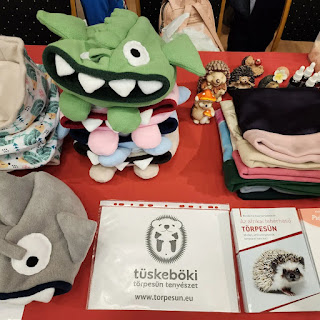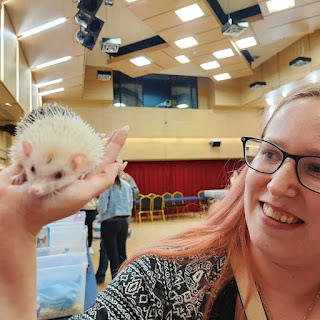Finding The Right Veterinarian For Your Pet Hedgehog
In Celebration of the Hedgehog
Why It's Important to Participate in Hedgehog Shows
 |
| Lovely contestant at the Budapest 2023 show. |
Hedgehog shows are events where hedgehog owners can showcase their pets, meet other hedgehog enthusiasts, participate in community and educational events, and compete for prizes. There are many benefits to participating in them, for both pet owners and hedgehog breeders.
1. Socialization: Hedgehogs may be solitary creatures, but we, the people who love them, are not. Hedgehog shows are an opportunity to build community, share information, make new friendships, and catch up with old friends. It is also a chance to talk with newcomers to the hobby and curious folks who wander in. Having a strong community around our hobby helps ensure that it will continue.
 |
| A young enthusiast meets a hedgie, |
2. Education: Hedgehog shows often include educational seminars and workshops for owners. These sessions cover a variety of topics, such as proper care and handling, health concerns, color identification, and breeding. By attending these events, owners can gain valuable knowledge and skills to take better care of their hedgehogs.
 |
| Petting a hedgehog for the very first time. |
3. Community: Participating in hedgehog shows can help owners feel like they are part of a larger community. Hedgehog ownership can be a niche interest and it can be hard to find others who share the same passion. By attending shows, owners can connect with like-minded people and build relationships with others who share their love for hedgehogs. Shows are the place for those of us who love to talk hedgehog all day long.
 |
| Some of the award ribbons from the Tulsa 2022 show. |
4. Recognition: Winning a prize at a hedgehog show can be source of pride for owners. The NAQA show system is based on points ranking and not relative ranking, so all hedgehogs will receive recognition for their points. This allows for recognition of the hard work and dedication that goes into caring for a hedgehog. Winning a competition can be a great way to showcase a hedgehog's special qualities and unique personality.
 |
| A proud prize winner. |
5. Exposure: Hedgehog shows provide breeders an opportunity to showcase their breeding program and the quality of their animals. It gives hedgehog related business owners a chance to introduce their products to potentially interested customers. This exposure can lead to increased interest in their hedgehogs/business and potentially more sales. It can help establish a breeder's reputation within the hedgehog community by building personal connections, by allowing people to see your hedgehogs in person., and by demonstrating the quality of your hedgehogs on the show table.
 |
| Photo of part of a vendor table at the Budapest 2023 show |
6. Networking: Hedgehog shows allow breeders and business owners to meet other breeders and enthusiasts. This networking can lead to valuable connections within the hedgehog community. Breeders can also share their own knowledge and experiences. For someone considering beginning a breeding program, shows are a great way to network and connect with a potential mentor.
 |
| Katee from Urban Hedgehogs evaluates a participant. |
7. Feedback: Hedgehog shows provide an opportunity for hedgehog owners and breeders to receive feedback on their hedgehogs from judges and other breeders. This feedback can help breeders to improve their breeding program and to produce higher quality hedgehogs.
 |
| A breeder talks with participants about their hedgehogs. |
8. Competition: Hedgehog shows include competition for various categories such as color/pattern, gender, and age. Points are awarded for conformation and personality. NAQA shows include separate categories for pet and pedigreed hedgehogs. Winning these competitions can be a source of pride for breeders and pet owners. For breeders, it also helps to establish and demonstrate the quality of their hedgehogs.
In conclusion, participating in hedgehog shows provides numerous benefits for hedgehog pet owners and hedgehog breeders. From exposure and networking to feedback and education, there are many reasons to consider attending hedgehog shows. If you're wild about hedgehogs, why not give it a try?
Avoiding Being Gotten By An Animal Scammer
Very sadly, animal scammers have been popping up all over the Internet, trying to pose as legitimate businesses, ripping people off for ridiculous amounts of money. As a person who has been raising animals for decades, it has been really frustrating to see my pictures ripped off and used as bait for scams on Instagram, Facebook, and goodness knows where else. The social media companies are very unresponsive to requests to take down these scammers, so I wanted to offer some tips to help increase the chance that you are giving your business to legitimate businesses and not getting fleeced by scammers. So, here we go:
1) If the pictures being used to advertise the animals for sale lack continuity. They feature clearly different people, different backgrounds, different styles. This isn't a sure sign, but a flag to do more checking. Most breeders have some kind of similarity in the kind of pictures they use to show off their hedgies for sale. They may use the same background, or a limited range of backgrounds, that you will see used repeatedly over time. For example, I use a particular place in my garden, my photo box, or a blanket background, depending on the time of year, The way that I label my hedgehogs (birthdate and gender on the top left corner, baby name in the top right corner, and parents' names underneath) is always the same format, If pictures don't seem to match, you can reverse search images to see if they show up on other people's pages. If you find something like a Facebook page offering hedgehogs for sale from 20 different Instagram accounts, it's clearly a scam.
2) If they insist on payment sight unseen using a platform that has no buyer protection. Paypal business (not friends and family) or using your credit/debit card with a square invoice allows you to challenge the charge and get your money back if you can show you have been scammed. Paypal friends and family, zelle, cashapp, and a variety of other services offer no recourse if you are scammed. It's worth paying a surcharge to cover the user fees if the business charges that for using something like Paypal business instead of friends and family, in order to ensure you have buyer protection. Do your due diligence and shop with business that want you to feel comfortable and be protected. Legitimate businesses do ask for payment up front. If they are putting an animal on hold or scheduling transportation, they don't want to be scammed on their efforts, either.
3) Other people in the same animal community confirm you're dealing with a legitimate business, on a platform that is who it says it is. Don't be afraid to ask. Sometimes scammers will make accounts that sounds similar to the real one (example: "XYZ Animals Transport" instead of "XYZ Animal Transport") and will steal the logo to trick people into thinking they are the real thing. If you smell a scam, ask a question you think will expose them and see if it does. If they claim to be an animal transporter, send a picture of a pride of lions and ask if they can transport them next week. If they say sure thing, send me your $ and I'm on it, run! If they claim to raise a variety of exotic animals, ask how much for a pangolin and if they tell you anything other than that isn't possible, run! If nobody has ever heard of them, don't send money until you've seen the goods.
4) The page is extremely new. This is an especially good way to identify a scam, if they are spoofing an established, legitimate business, but the date the account was created was only 3 weeks ago, then it clearly isn't the real one. If the business is super new, you'll want to see what you are getting or make sure you have buyer protection on any funds you send.
5) They have no reviews, or their reviews are all 5 star and posted in a very short period of time. Most customers don't leave reviews, so it's very normal for reviews to trickle in over time and very unusual to have a whole bunch of people are glowingly happy and leaving reviews in a tiny time period. This is especially true if the page is fairly new.
6) Communication is stilted, doesn't flow, or doesn't make sense. Many scammers operate from overseas so if they are communicating as though it isn't their first language or they don't seem to know much about what they are selling, these are flags to do more checking. If they are telling you a bunch of weird excuses that don't add up at all, be suspicious. They may have other jobs or family obligations that interfere with things going perfectly smoothly, but it should at least make sense and be concerned about making sure that your needs are being taken care of.
7) The deal sounds too good to be true and/or requires you to act urgently. You need time to be able to think through your decision and if it sounds too good to be true, it might be.
I'm sure there are other things to watch out for but checking these seven things should help you avoid a lot of the scammers out there. Please use the comments to add your suggestions!
Long Eared Hedgehogs
Cold Weather Tips
With a polar vortex predicted to drop temperatures to extreme levels in the next week, it seemed timely to talk about how to keep hedgies safe during periods of unusually cold weather. Cage locations that may normally be fine can cause temperature drops if they are near a window or other draft, or set on the floor.
Insulation between the floor and cage (carpet, a blanket or towel, etc...) can help prevent the cold flooring surface from chilling the cage. Covering the window or the side of the cage nearest to the window with a blanket can help insulate, just make sure that hedgie has ventilation.
Ceramic heat elements and heat lamps can be a fire risk, so check that all equipment is in good working order and plugged in to a surge protector.
It is helpful to stock up on hand warmers that do not require electricity to activate (like hot hands) in case of power outages. Providing extra bedding such as snuggle sacks and paper towels can help hedgies hold in their body heat when they are hunkered down.
Be sure to check your hedgies extra carefully for signs of hibernation when winter weather is more extreme. If you notice that your hedgie seems chilled, your body heat is a great way quickly warm a hedgie.
Stay safe and warm, and keep snuggling those hedgies!
Where Can I Find Science-based Information About Hedgehogs?
One absolute truth about the Internet is that it is full of information. The unfortunate truth is that not all of that information is of equal quality. When it comes to our little quilly friends, we want to make sure that the information we use to make decisions about what they need is based on good quality information.
If you read websites or join hedgehog interest groups, you are going to find a lot of information. Some of it seems to make a lot of sense, some of it seems kind of nonsense, and people will argue about what is true until you just want to put your quills up and go snooze in a nice, cozy tunnel.
My favorite source of science-based information is Google Scholar. Google Scholar is a google based search engine of scholarly journals/articles. This is where you can easily search for articles that are published in peer-reviewed journals. To be published in a peer-reviewed journal an article has to meet a higher standard than things that just anybody can publish on the Internet.
Searching Google Scholar can be a bit daunting at first. If you put in the search term "hedgehog" you will get a whole bunch of articles about the hedgehog signaling pathway, which has to do with neurology, not hedgehoggery. I have found that using the scientific name of our quilly buddies, atelerix albiventris, gets a much better selection of articles.
One important article I would like to point out is Fiber Digestion in the African White Bellied Hedgehog. If you click the .pdf icon on the article's abstract page, it will take you to the full article, which contains very important information about hedgehog's need for chitin/dietary fiber. Curious about the content of insects that hedgehogs eat? Try this article.
For the most current research on Wobbly Hedgehog Syndrome, a search of "atelerix albiventris WHS 2020" brought up this very informative article. If your hedgehog is sick for any reason, this would be a good article to take to your vet as it includes normal blood values for hedgehogs.
Happy researching!
Finding The Right Veterinarian For Your Pet Hedgehog
Finding the right veterinarian is an essential task for all hedgehog owners. It is a good idea to have a veterinarian lined up before you ...

-
In twilight's embrace, where secrets unfold. A creature awakes, both timid and bold. With quills of enchantment, a spiky disguise. Th...
-
Finding the right veterinarian is an essential task for all hedgehog owners. It is a good idea to have a veterinarian lined up before you ...
-
Lovely contestant at the Budapest 2023 show. Hedgehog shows are events where hedgehog owners can showcase their pets, meet other hedgehog ...










